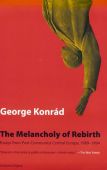Idegennyelvű kiadások

|
Die Melancholie der Wiedergeburt Suhrkamp, 1992 német |

|
The melancholy of rebirth: essays from post-communist Central Europe, 1989-1994 Harcourt Brace, 1995 angol |

|
Wielkie wyzwanie: Europa ¦rodkowo-Wschodnia po komunizmie Niezależna Oficyna Wydawnicza, 1994 lengyel |
 |
The melancholy of rebirth: essays from post-communist Central Europe, 1989-1994Fordító: Michael Henry HeimKiadó: Harcourt Brace Kiadás helye: San Diego Kiadás éve: 1995 ISBN szám: 978-0156002523 Nyelv: angol |
Editorial Reviews:
From Publishers Weekly
If anything can be melancholy and optimistic at the same time, it is this collection of 26 speeches, essays, diary entries and more. After a close call with the Nazis, the Hungarian Jewish author of The Case Worker later ran afoul of the Communists. Having seen the worst of both right and left,Konrad is a cheerleader for democracy and individualism. But the enthusiasm of 1989 is quickly replaced by a warier voice as the struggle for independence takes on ultranationalistic and . Soon he's not merely cheerleader but umpire as well, trying to encourage the best and thwart the worst in intellectuals, Hungarian Croats and Serbs, and just plain folk. That it provides an opportunity to watch this change is probably this collection's greatest value. As analysis, it falls a bit short: Perhaps because of his own intense longing (and the rhetoric needed to inspire others), Konrad tends to be naive about both Hungary and its Western models (he ignores the likes of Jean Marie Le Pen when he notes, ``Mature nations have put flaming egocentrism behind them.... ordinary people suddenly puff up with a belief in their unique replique montre , often just after a successful demagogue... has appeared on the scene, dazzling them with his megalomaniacal dream''). While Heim touches on additional points in his afterword, further contextualization would have been helpful for readers who don't remember much about the Democratic Charter or Sandor Petofi.
Copyright 1995 Cahners Business Information, Inc.
From Library Journal
Although written in the heat of Central Europe's recent history, these 26 essays remain hopeful for an improved society. Most concern the author's native Hungary, with a few on the Yugoslavia conflict or the larger region. Konrad is a well-known novelist, long published primarily in the West and underground at home; his years of services work have enabled him to see the personal effects of social policy and to reflect on the proper role of the individual acting within his community. He sees the current transition in Hungary as an escape from an aberrant period of its history (postwar communism) and a return to its normal condition of . Although the transitions continue, he argues that replica horloges change can occur without a period of reaction or backlash-but only if individuals accept responsibility for the outcome. These thoughtful essays add to the discussion on a topic of current interest. For larger collections.
